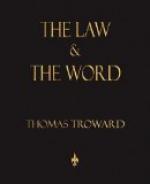The neutralizing power then, is not that of the flowing of any sort of energy, but the rigidity, or inertia of the medium through which the energy has to make its way; thus bringing us back to rouah and hoshech, the expansive and compressive principles of the opening verses of Genesis. It is the broad scientific generalization of the opposition between Ertia, or Energy, and Inertia, or Absence of Energy; and since, for the reasons just given, Ertia cannot go against itself, the only thing that can stop it is Inertia.
Now the components of the human body are simply various chemical elements—so much carbon, so much hydrogen, etc., as any textbook on the subject will tell you; and although, of course, every sort of substance is the abode of ceaseless atomic energy, we all recognize that merely atomic energy is not that of the powers of thought, will, and perception, which make us organized mentalities instead of a mere aggregation of the various substances exposed to view in a biological museum, as constituting the human body—you might take all these substances in their proper proportions, and shake them up together, but you would not make an intelligent man of them. We are therefore safe in saying that the physiological body represents the principle of inertia in us, while the something that thinks in us represents the principle of Ertia.
The balance of power between the Life Principle in us and the Death Principle, is then, necessarily, a question of the balance between these two, the spirit and the flesh, or ertia and inertia.
Why then does the balance preponderate to the life-side for a certain length of time, and then go over to the opposite side?
Now this brings us to the distinction which the old writers drew, between the “Vital Soul” of any living thing and the Spirit. Their conception of the “Vital Soul” was very much the same as I have set forth in the chapter on “The Soul of the Subject.” It is the individual’s particular share of the Cosmic Soul or Anima Mundi, whether it be an individual tree, or an individual person; and the ordinary maximum length of time, during which the Vital Soul will be able to overcome the inertia of its physical vehicle, depends upon the particular class to which the individual belongs. What the ordinary maximum is in regard to any species is a matter of experience, and it is in this way that we have fixed the usual limit of human life at three-score years and ten.




